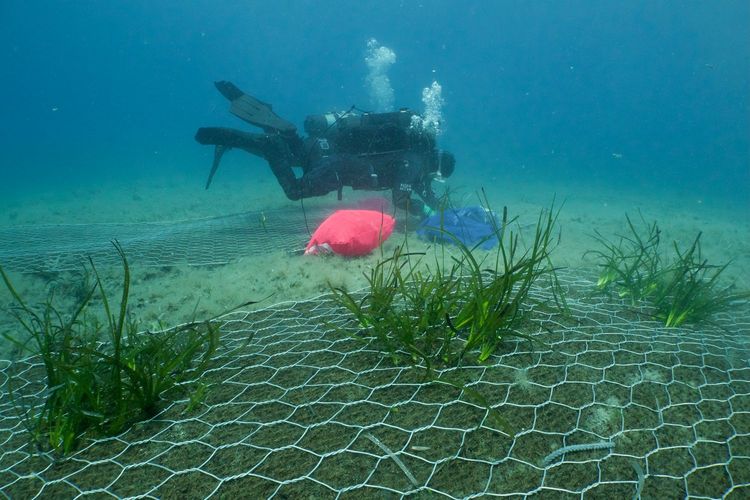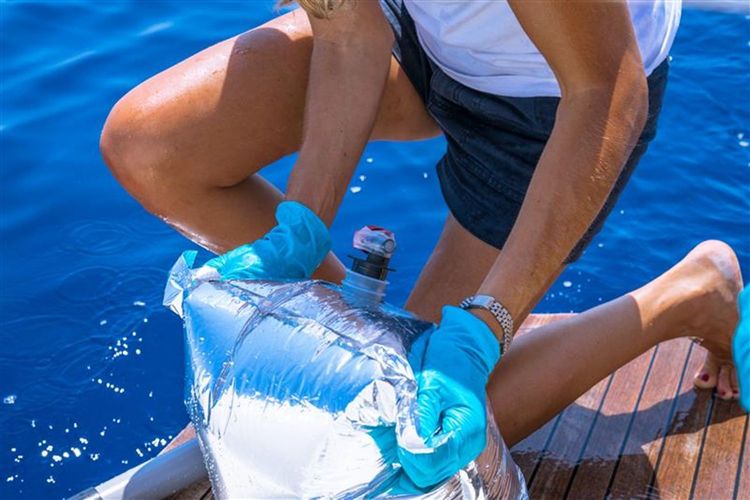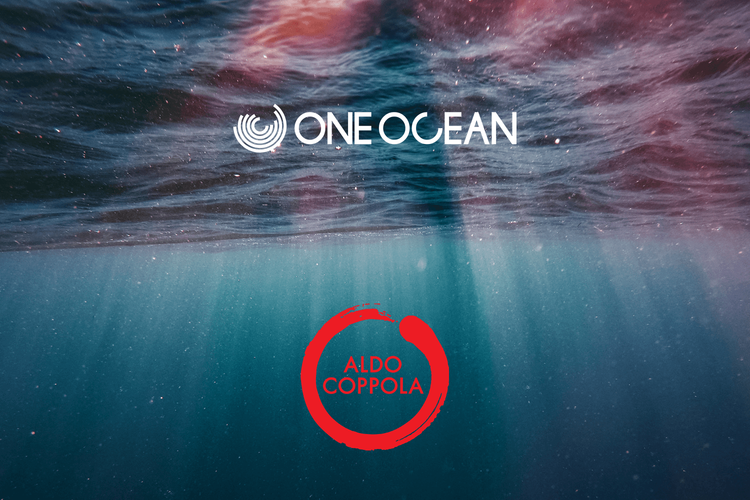
One Ocean Foundation, a non-profit organization operating internationally for the protection of the marine environment, this morning presented the expansion of the Blue Forest project in Sardinia, in the bay of Cala di Volpe. It is the most extensive marine reforestation initiative in the Mediterranean Sea, focused on the protection and restoration of Posidonia oceanica, an endemic plant of our seas and vital to the health of marine ecosystems.
The initiative stems from a scientific collaboration between One Ocean Foundation and the University of Sassari, with technical support from the International School for Scientific Diving and backing from partners such as Pirelli, which enabled the project’s launch, and Smeralda Holding, together with a growing network of companies and institutions committed to ocean conservation.
Intervention area: Cala di Volpe
The project covers around 80 hectares of marine area within the Cala di Volpe mooring field, home to a damaged Posidonia oceanica meadow, impacted before access and anchoring regulations were established.
A crucial first step in protecting the area was taken over 20 years ago by Smeralda Holding, with the creation of the mooring field to regulate access and safeguard the marine ecosystem, reducing human pressure on the seagrass meadow. The system, still in place today, bans free anchoring and allows controlled access—both essential conditions for ecological restoration efforts.
“Cala di Volpe and the entire coast of the Municipality of Arzachena are areas of great environmental value: delicate ecosystems that must be protected, both on land and underwater. Safeguarding Posidonia oceanica is a concrete action to preserve the identity of our territory, especially due to its role in preventing coastal erosion. This project brings together scientists, private companies, and foundations in a virtuous synergy—an initiative our municipality can only support and embrace,” said Arzachena Mayor Roberto Ragnedda.
Project phases and scientific research
Led by Dr. Giulia Ceccherelli from the Department of Chemical, Physical, Mathematical, and Natural Sciences of the University of Sassari and technically coordinated by Dr. Stefano Acunto (I.S.S.D.), the project follows a scientific and experimental approach aimed at identifying scalable solutions for large-scale marine reforestation.
1. Mapping the Area
The initial phase involved pre-restoration mapping of approximately 80 hectares of seabed to identify suitable zones for reforestation. Activities, coordinated by the university spin-off Geomars under the guidance of Prof. Vincenzo Pascucci, used advanced tools such as Side Scan Sonar and ROVs, along with scuba dives, to produce a high-resolution biocenotic map of the Posidonia oceanica meadow in the bay.
2. Marine Reforestation
Initial transplanting activities have already been completed over approximately 500 square meters, using biodegradable coconut fiber and metal mesh mats installed on the seabed, each hosting about 20 cuttings per square meter. The cuttings, collected exclusively from naturally uprooted specimens in the bay's sedimentation zones, will be complemented by an experimental phase using seedlings from beached fruits collected after exceptional winter flowering events.
3. Research and Monitoring
Following reforestation, a three-year scientific monitoring phase is planned. The University of Sassari team will assess the temporal evolution of the morphological and physiological state of the restored meadow and conduct biodiversity analyses using innovative techniques such as ecoacoustics and artificial intelligence for processing environmental data.
“Combining reforestation with scientific research will significantly contribute to existing knowledge on Posidonia oceanica restoration, improving the effectiveness of restoration actions and ensuring a concrete and lasting impact on associated ecosystem services. This integrated approach will also allow for better monitoring of habitat responses to environmental change, optimization of transplant techniques, and support for the long-term sustainable management of seagrass meadows,” explains Prof. Ceccherelli.
The role of partner companies
Projects of this scale require the participation of visionary companies that believe in a future where economic progress and environmental protection go hand in hand. Smeralda Holding, a local company, and Pirelli, a global multinational, are two such examples.
“For many years, Smeralda Holding has invested in sustainability and marine ecosystem protection through concrete actions, such as installing the Cala di Volpe mooring field,” said Mario Ferraro, CEO of Smeralda Holding. “This project, launched 20 years ago, marked a real first step in protecting our seabed and Posidonia, by regulating access to the bay. Preserving and protecting the territory and the sea of Costa Smeralda is a top priority for us, as is finding new ways to apply this commitment. The Blue Forest project—endorsed by us from the outset—is a tangible example of this. Collaboration and a shared vision toward a common goal are essential to tackle the challenge of biodiversity conservation in Costa Smeralda, and we hope many other stakeholders will join us to make this model replicable in many other tourist destinations.”
“Biodiversity protection is a key part of Pirelli’s strategy, and our investments in research and development aim at solutions that reduce environmental impact. Economic growth and nature conservation must go hand in hand, which is why Pirelli is proud to support One Ocean Foundation in its Blue Forest project. Supporting the restoration of Posidonia oceanica, a marine plant crucial for the Mediterranean ecosystem, means protecting an invaluable ecological asset and promoting a vision of progress that puts nature at the center,” said Filippo Bettini, Senior Advisor for Sustainability at Pirelli."
The Foundation’s goal is to bring together a coalition of businesses united by a shared commitment to protecting blue natural capital, making these actions increasingly scalable and replicable.
The Blue Forest project by One Ocean Foundation
Blue Forest, the marine reforestation project launched by One Ocean Foundation in 2023, currently includes four active sites in Liguria, one in Apulia, and one in Sardinia. Since its inception, it has engaged universities, research centers, and companies, and funded PhD programs and awareness campaigns on the critical role of Posidonia oceanica for biodiversity and ocean health. This marine plant, protected under international law, grows exclusively along Mediterranean coasts up to 40 meters deep and plays an essential ecological role. It forms vast underwater meadows that act as natural barriers against coastal erosion and biodiversity hotspots, hosting over 350 species that use them for shelter, food, and reproduction. Moreover, it is responsible for about 80% of coastal oxygen production and is a key ally in the fight against climate change, storing large amounts of carbon dioxide in marine sediments and removing it from the atmosphere—potentially forever.
Jan Pachner, Secretary General of One Ocean Foundation, concluded: “The expansion of the Blue Forest project in Sardinia marks an important step in our mission to protect marine ecosystems and recognize the value of blue natural capital. Taking active measures to protect and restore Posidonia meadows means preserving biodiversity and promoting ocean health, on which our future depends. This initiative is born from collaboration between organizations, businesses, and institutions—a concrete network of alliances demonstrating that cooperation is key to addressing environmental challenges and building a real ecological transition.”


